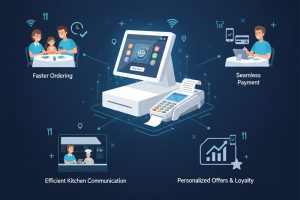Small businesses across Canada are experiencing a digital transformation, and one of the biggest drivers of this change is the rise of Mobile POS Systems. Whether it’s a food truck in Toronto, a boutique store in Vancouver, or a pop-up shop in Halifax, entrepreneurs are embracing mobile technology to streamline transactions, enhance customer experiences, and stay competitive.
Gone are the days when point-of-sale technology was bulky, expensive, and confined to a countertop. Today’s Mobile POS Systems combine portability and affordability—making them a game-changer for small business owners.
1. What Are Mobile POS Systems?
Mobile POS Systems (Point-of-Sale Systems) are software and hardware solutions that allow businesses to process sales and manage transactions using smartphones, tablets, or other portable devices. These systems are often paired with card readers, barcode scanners, and receipt printers, creating a full-service checkout experience that can be used anywhere. Unlike traditional cash registers, mobile POS solutions operate through cloud-based platforms, enabling business owners to access sales data, manage inventory, and generate reports from any location.
2. The Rise of Mobile Payment Systems in Canada
The Canadian retail landscape has been quick to adopt mobile payment systems like Apple Pay, Google Pay, and tap-to-pay credit and debit cards. Customers increasingly expect quick, contactless transactions—especially after the shift in consumer habits during the pandemic.
By integrating these payment methods into Mobile POS Systems, small businesses can serve tech-savvy customers while ensuring security and compliance with industry standards. This flexibility makes it easier for small businesses to meet modern consumer expectations.
3. Why Small Businesses Are Making the Switch
For many small businesses, switching to a mobile POS is about more than just accepting payments—it’s about improving the entire customer experience. Some key benefits include:
-
Portability – Serve customers on the sales floor, at outdoor markets, or during special events without being tied to a fixed location.
-
Lower Costs – Many POS apps offer subscription-based pricing with little to no upfront hardware investment.
-
Faster Transactions – Reduce wait times with quick, tap-and-go processing.
-
Improved Analytics – Track sales trends, top-selling products, and customer behaviour in real time.
4. Mobile POS Systems and Retail Tech Integration
Modern Mobile POS Systems often integrate seamlessly with other retail tech solutions, such as inventory management software, customer relationship management (CRM) tools, and loyalty programs. This allows businesses to:
-
Automatically update stock levels when items are sold.
-
Send targeted promotions to customers based on purchase history.
-
Offer rewards programs to encourage repeat visits.
By combining point-of-sale technology with retail tech tools, small businesses can create a more personalized shopping experience that drives customer loyalty.
5. The Role of POS Apps
POS apps are the backbone of mobile POS functionality. These applications can be installed on iOS or Android devices and often work with a variety of third-party hardware. Popular POS apps offer features like:
-
Inventory tracking
-
Employee time management
-
Multi-location sales data
-
Integration with eCommerce platforms
For example, a coffee shop using a POS app can take in-person orders, manage online sales, and track all transactions in one unified dashboard.
6. Boosting Sales Opportunities
One of the biggest advantages of adopting a mobile POS is the ability to sell anywhere. Small businesses are no longer limited to a single storefront—they can expand their reach to:
-
Local festivals and events
-
Farmers’ markets
-
Trade shows
-
Mobile pop-up locations
By taking the checkout process directly to the customer, businesses can capture sales they might otherwise miss. This flexibility is especially valuable for seasonal or niche markets.
7. Security and Compliance
Some small business owners worry about the safety of mobile transactions, but modern Mobile POS Systems include advanced security features like end-to-end encryption, tokenization, and PCI compliance. This ensures that sensitive customer data is protected.
In Canada, compliance with mobile payment systems standards is a must. Reputable POS providers stay up to date with these requirements, helping businesses maintain trust and avoid legal risks.
8. Real-Time Data for Smarter Decisions
Traditional registers only record sales totals at the end of the day, but mobile POS systems provide real-time insights. Owners can monitor performance from their phone—whether they’re in the shop, on vacation, or at another business location. This instant access to data means small business owners can make informed decisions quickly, such as adjusting prices, ordering more inventory, or launching a flash sale.
9. Easier Employee Management
Many Mobile POS Systems allow for individual employee logins, helping track sales performance by staff member. This can be valuable for scheduling, training, and incentive programs. Some systems also integrate with payroll tools, saving time and reducing administrative errors.
10. Scalability for Growing Businesses
A small business might start with a single mobile POS device, but as sales grow, it’s easy to add more devices, locations, or features. This scalability allows small businesses to grow without the need for costly hardware upgrades or software changes.
11. Industry Examples in Canada
Mobile POS solutions are being adopted across a variety of industries in Canada:
-
Food trucks – Accept card payments on the go without a traditional terminal.
-
Retail boutiques – Move around the store to serve customers anywhere.
-
Service providers – From hairstylists to personal trainers, POS apps make mobile payments easy.
-
Pop-up shops – Quickly set up and sell at events without a permanent checkout counter.
12. Future of Mobile POS Systems in Canada
The future of Mobile POS Systems is tied to innovations in retail tech and mobile commerce. Expect to see:
-
Greater AI integration for customer analytics.
-
More advanced loyalty and rewards features.
-
Deeper integration with eCommerce platforms.
-
Faster, more secure mobile payment options.
As technology continues to advance, mobile POS solutions will become even more accessible, affordable, and powerful for Canadian small businesses.
Final Thoughts
For small businesses in Canada, adopting Mobile POS Systems is more than just a tech upgrade—it’s a strategic move toward efficiency, customer satisfaction, and growth. By embracing portable payment solutions, integrating with other retail tech tools, and taking advantage of POS apps, small business owners can adapt to changing consumer behaviors while staying ahead of the competition.
In an age where speed, convenience, and flexibility are essential, mobile POS technology is proving to be one of the most impactful investments a small business can make.
FAQ’s
Q1. What is a mobile POS?
A: A mobile POS is a point-of-sale system that operates on portable devices like smartphones or tablets, enabling businesses to process payments and manage sales anywhere.
Q2. How does mobile POS work for small businesses?
A: Mobile POS systems connect to the internet and use apps to process transactions, track inventory, and generate sales reports, offering flexibility and efficiency for on-the-go businesses.




